i'm rereading one piece, with in-depth analysis of each chapter, cover story, and more. CURRENTLY: romance dawn
Don't wanna be here? Send us removal request.
Text
One Piece Reread Chapter 5: The King of the Pirates and the Master Swordsman
(prev | index | next - coming soon)

What a title. Let's get into it.
It's funny to see Luffy so impatient with Helmeppo, and so unapologetic about using him as a human shield. It's not surprising, but I feel that it's often forgotten that Luffy is a bit ruthless. This is especially true early on, when he hasn't quite learned more leaderly qualities like patience.


The focal point of this chapter is in the exchange between Koby and Zoro. Where Luffy almost goes out of his way to avoid telling Zoro about the Marines' broken promise, Koby tells him about it right away. His approach is a more pragmatic one - "the Navy is your enemy now". He looks for no permanent promise from Zoro, just a temporary cooperation in the name of sparing his life. "I won't ask you to become a pirate," he says - exactly the opposite of what Luffy told him. Luffy is selfish enough to ask this of Zoro; Koby only asks him to escape, to live. Zoro visibly turns all of this over. Did it take both Koby and Luffy to convince him? Was it the contrast of Luffy and Koby's approaches causing him to realize he preferred the former? Was there something in Koby's faith that spoke to Zoro?


Also of note is how passionately Zoro reacts to learning that the promise he made was not intended to be honored - the firing squad arrives, and that word comes up again by the end. For now, though, Zoro says "I can't die yet", when we know that he will, in the future, he's willing to give his life for Luffy's, for the crew. In both cases, it's a promise he made. It is immediately clear that a promise means a great deal to Zoro - he was fully prepared to follow through on the raw deal he cut with Morgan, and seems almost blindsided by the fact that a promise could be so easily broken.
This is, of course, rooted in his history with Kuina, who has always been an interesting character. On the surface, she's a relatively shallow character, one rooted in Zoro's past, who exists to anchor his motivation and his history (though Zoro notably already had the ambition to become the world's greatest swordsman - and, to sail at sea - was he imitating his parents? Hoping to become strong enough to avoid their end?). The simplest way to do this character, however, would have been the more stereotypical male rival.
Oda makes the choice to write Kuina as a girl, and specifically as a girl who struggles with misogyny - people love to write off Koshiro's "girls can't be master swordsmen" statement as a one-off, but his attitude is clearly on display in how he reacts to the goings-on in his own dojo. It's clear that this is the limiting reality which Kuina lives in.

Following the famous moonlight duel, Zoro forcefully rejects the notion of his and Kuina's inherent inequality - not for entirely altruistic reasons. If he defeats Kuina, not because he became stronger, but because she grew weaker, it would diminish his victory. This is an establishing moment in Zoro's foundational view of the world in terms of strong vs weak, victor vs loser, etc. He clearly doesn't have an inherent disrespect for the weak - he still protected Rika from the dog - but the people he respects the most, the ones he primarily concerns himself with - are those he considers to be strong. It's a shame that Oda - thus far - hasn't taken advantage of this solid jumping-off point for a character arc, or at least some more in-depth character writing.
Then Kuina dies, and the thing that Zoro fixates on is her inability to fulfil their promise - he'll simply have to do so for both of them, and he vows to become a swordsman so great his name will be heard in heaven - perhaps to reach her there. Oda drives this promise theming in an extraordinarily heavy-handed way, closing Zoro's flashback with "I promised her, I can't die yet". I can only imagine that this was all to set up how meaningful his impending promise to Luffy will be.

I believe that this is the moment where Zoro's mind is made up. "What are you?" he asks - not who. Even if Luffy is invulnerable to bullets, to stand in front of a firing squad still shows nerves of steel (he does admit later on, in speaking to Gaimon, that he doesn't like to be shot, which makes this a meaningful gesture, even if he plays it off lighthearted). We know now, with the neatly-juxtaposed flashback, what catches Zoro's eye in a person - and furthermore, that the thought is fresh in his mind (and God knows why adaptations insist on moving this bit around). We get our infamous "You must be the son of the Devil": here is our first case of Luffy reminding someone of the very core of who they are (very often, the person they were when they were just a child, too young to have any conceit or baggage to mask their true self), and making them bold enough to come back to it. Zoro wants to sail the seas. "You've got yourself a pirate," he says.
1 note
·
View note
Text
One Piece Reread Chapter 4: The Great Captain Morgan
(prev | index | next)

No cover page this chapter, we get right into it - the fact that Luffy loathes people hiding behind another's reputation, especially a parent's, comes as no surprise. What does strike a positive chord with me here is how Luffy, in real time, seems to remember Shanks' way after his temper has died down. "He's not worth hitting," he says, though it's after he takes a breath and lets go of his initial anger. He still has a ways to go before he becomes the captain who lets Bellamy get his licks in without lifting a finger in Jaya. True to form, though, if it's for the sake of his friend, he'd hit him a few more times just for good measure.

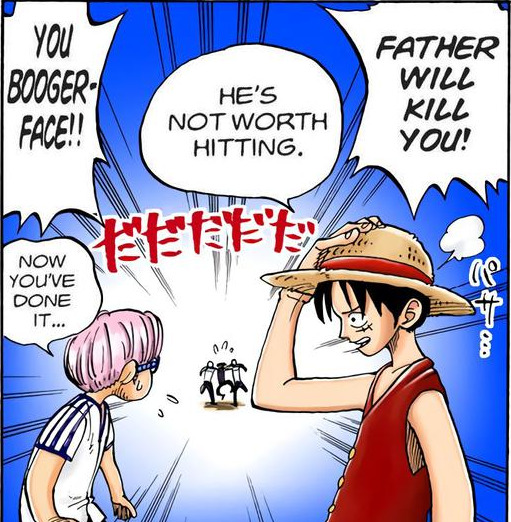

Koby is still petrified of the consequences, but Luffy, uncaring, heads off to find Zoro.
A brief interlude for Morgan - one wonders if tax collection falls under Marine purview. Is it simply because Shells Town appears to be a very small settlement, without even a mayor or other civil authority? Could it be that all of Shells is on World Government property, rendering the entire thing a military installation under the 153rd's jurisdiction? It's clear that the Marines seem to act as the police for the town. Among the injustices named by the citizens, they zero in on executions and other harsh punishments, but never object to the levies, which makes me think that the Marines functioning as the tax man may not be entirely unusual.

Back in the yard, we come to the more famous second recruitment conversation between Luffy and Zoro - Zoro is notably opposed to pirates, as this is the second time he's not only rejected, but denigrated the prospect. Luffy questions if it's a matter of reputation, but Zoro shoots this down. He doesn't give a damn what everyone else thinks of him, but he (1) lives by his own code, which involves (a) never doing anything he's regretted. Once again, this raises the contemplative silence from Luffy. Oda goes as far as to give him a "..." to really show us that this is resonating with him, somehow, making him think. You might recall that I put a pin in Chapter 2, on the notion that Luffy lives his life on the guiding principle of "no regrets" - I believe that, here, he's realizing that he and Zoro have even more in common than he already thought, and it only strengthens his resolve to recruit him. He refuses to take no for an answer, because it's not only himself, now, who will feel regret for not getting Zoro to come with him - it's Zoro who will end up regretting this end. (As for "Why doesn't he just tell Zoro about their plan to execute him?" Simple - I believe Luffy sees it as an honourable act, and doesn't want Zoro to regret it. He likes the man that Zoro is, and he doesn't want to give him cause to hesitate to act this way again in the future.)


To put it lightly, Morgan is an incredibly ham-fisted (or, axe-fisted) character - a very overblown amalgamation of just about every dishonourable trope in the book. I believe it's intentional, though - being introduced to the Marines in this way swiftly informs us of the present state of the organisation. It's corrupt, rife with abuse of power, and rife with individuals that are more concerned with their own status than the wellbeing of the citizens they are charged with protecting.



The reality of the situation hasn't been lost on Koby, who's been galvanised to the point where he has a clear path forward. He hasn't yet seen himself as someone who's capable of cleaning house, but he does, at least, know he wants to be the "right kind" of Marine. He and Zoro have a moment of understanding, over Luffy's seemingly-impossible ways, but Koby has come to see the light. He sympathises with how crazy it seems at first, but he's bought in: "He'll succeed or die trying! That's how he is!" That impossible faith has begun to rub off on him.


We close this chapter with a very sobering panel, and with Luffy on the loose with Helmeppo as hostage, in search of Zoro's swords...

4 notes
·
View notes
Text
One Piece Reread Chapter 3: Enter Zoro - Pirate Hunter
(prev | index | next)

Sometimes you can practically taste the rapid readjustment of someone's point of view coming. The first page of this chapter might as well be a flashing neon sign warning of the death knell of Koby's overly simplistic view of the world.
(We can also see that Luffy's tendency to sit on the prow is already well-intact. Cute.)

Another contrast in Koby and Luffy shows in Koby's preparedness (and ability to navigate at sea) contrasted with Luffy's tendency to just float around. The dark side of free spirits, one supposes. Either way, in their relatively short time together, Koby has advanced to the point where he can fearlessly nag Luffy about needing to hire a navigator. They've developed camaraderie enough that Koby is already teary at the prospect of their parting ways, though the matter is postponed by their fascination over the townspeople's equal fear of Zoro and Captain Morgan.
Speaking of, we finally see Zoro, and the first thing he does is try to mess with Koby and Luffy. It's interesting that the story pulls a fake-out like this, one which, at first, seems to confirm Koby's initial suspicion, before being immediately disproven by Rika's arrival. Given I have an insider's perspective on Zoro's sense of humour, I consider it to be fairly likely that he only pulled this because he could see Koby was already scared, even at that distance. But it makes you wonder - is this a small commentary on assumptions being a self-fulfilling prophecy?
(The fresh blood on Zoro also suggests that he's probably being beaten by the Marines, in addition to the starvation and dehydration, which is a pretty damning early indication of the ethics of the organization.)

Following the interaction with Helmeppo, we see the first of what I call the "Luffy contemplation" panels. This is something I noticed even on my first read-through, that Oda has a tendency to show a panel of Luffy with a thoughtful expression after something has happened. He's clearly thinking about something, though we aren't told what - we're left to infer by what has just happened, and by what immediately happens next.

Luffy is an instinctual person, but not a thoughtless one. He tells Zoro in the ensuing panels "I haven't decided if I'll ask you yet... You've got a pretty bad reputation, you know?" It's clear that he's already taken somewhat of a liking to Zoro (one which is quite obviously solidified after the following incident with the rice ball), but he also respects that Zoro has his own plans, and his own path to follow.
This first conversation of theirs is an interesting one - they're clearly sizing each other up, asking questions that they either allude or sidestep answers to. In the end, neither of them are really interested in each other's pasts. Luffy, on his end, is more compelled by Zoro's present actions - that dig at his reputation reads as more teasing than anything else. He's not taking it seriously, and he and Zoro are both all smiles, bantering back and forth. It's clear that, on some level, they already get each other.


Koby, in following with his status as Luffy's foil, begins to shift in his estimation of Zoro after hearing the why of his imprisonment - once he establishes the line of logic in his mind, it doesn't make sense that Zoro is locked up, it isn't a just action, he's immediately against the idea. Helmeppo and every Marine in the 153rd falls squarely on his shit list.

More dramatic, however, is Luffy's reaction to Helmeppo's declaration that Zoro is slated for execution. This is no Devil Fruit-enhanced shounen-type move; this is a pedestrian punch. Luffy was angry enough to grab Helmeppo by the shirt and lay him out the old-fashioned way, no preamble and no pizazz. It's the type of anger that's actually quite rare to see on Luffy.

Koby has rapidly reconciled with the fact that Helmeppo is scum, but he still advocates against the idea of rocking the boat. Luffy, however, has no such scruples - the combination of his estimation of Zoro's true nature and the revelation that he's honour-bound to a promise that's not intended to be upheld makes up his mind about his very first recruit.
2 notes
·
View notes
Text
One Piece Reread Chapter 2: They Call Him "Straw Hat Luffy"
(prev | index | next)
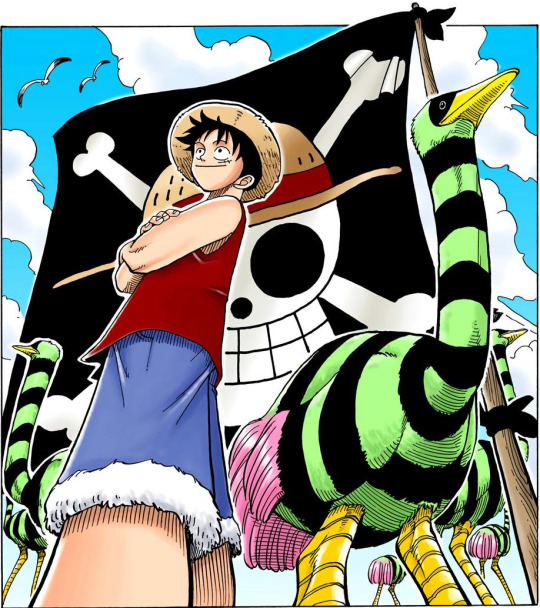
We open on a delightfully pink Miss Love Duck - for all the lovely details it provides, the colour manga regrettably suffers from the very Oda art-typical problem of everyone having the same (pale) skin tone.
On the topic of adaptations, once again, each of them has moved the action from the island Alvida uses as her base to aboard the Miss Love Duck itself, at sea - both Toei's anime and Netflix's show (which I'm beginning to suspect may be more of an adaptation of the anime, rather than the manga) insert another ship being pillaged by Alvida's crew. Perhaps to make things more piratey? I'm not sure. It seems like a fairly innocuous change on paper, but put a pin in this - I'll be coming back around to it later.
This chapter, notably, also gives us Koby, and foreshadows Zoro's introduction via the pirates speaking fearfully of how they hear the Marines have him locked up (word must travel fast, since we know Zoro only spent nine days in the yard).
For now, though, we have Koby, who arrives to the narrative in an already-interesting predicament. He's kind, clearly terrified of Alvida, and quite resigned to his fate - he immediately offers up the boat he's spent two years fashioning for Luffy's escape, having resigned himself to spending the rest of her life under her thumb. Two years is the length of time he's spent as a captive of the pirates, meaning he began plans for an escape immediately after his capture. The boat is in a finished state, clearly, if he's offering it to Luffy, which means that, for an unknown length of time, Koby had a perfectly serviceable way out that he just... didn't take. Perhaps he continued to fine-tune it, to rework it, anything to have an excuse not to take that final step.

Luffy even points this out, asking quite literally "Why don't you just escape?" His ensuing estimation of Koby's character is, as he says, quite blunt, but there's quite a bit of truth to it. If there wasn't, Koby could have called him cruel instead of frank. The way that Luffy speaks to him here, though more good-natured, mirrors the things that Alvida says to him. The tone differs, as does the intent (Luffy is simply making an observation, he has no desire to own Koby), but the similarity of the words, coupled with Koby's lack of disagreement and what we can infer about him based upon this exchange, paints quite an unfortunate picture. Koby, at least on some level, has stayed where he is because there's a part of him that agrees with how Alvida sees him. He has no self-esteem, no belief in his own ability or worth, and lingers in a terrible situation for no other reason than the fact that it's familiar.
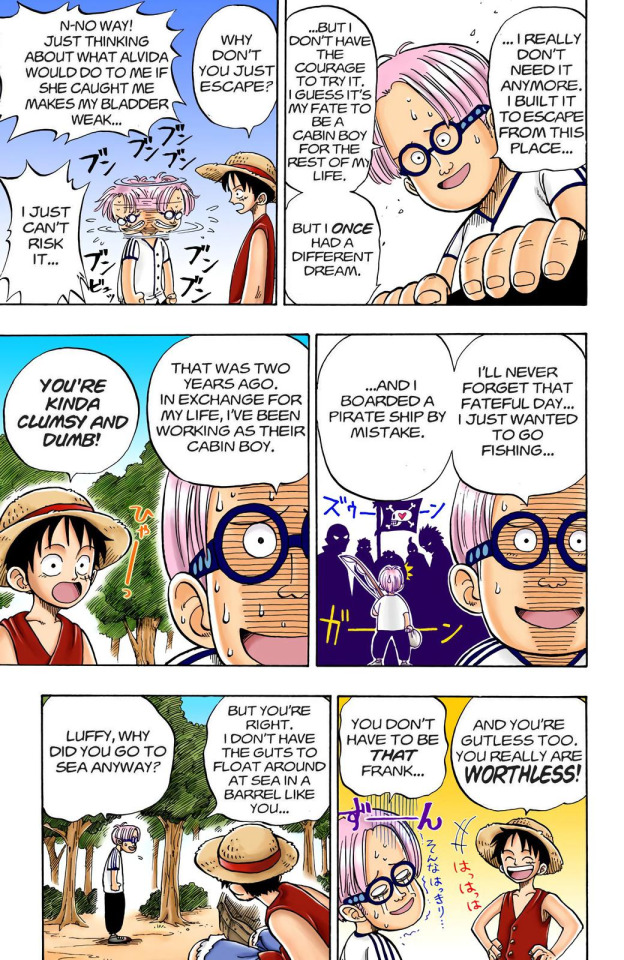
This is why I think the adaptations make a mistake by moving the action from Alvida's island base to the Miss Love Duck. This telling exchange is centred around Koby's makeshift boat, his escape route that he's just been sitting on, and the fact is that he could only hide such a thing on an island. By removing the action to a setting where he wouldn't be able to hide an entire boat (and in Netflix's case, by reworking Luffy's friendly, but rather scathing estimation into a nicer pep talk), there's a lot of characterization that gets lost. (On a more minor note, being on a ship requires Luffy and Koby to lower their voices to escape notice, which detracts from the emotion of the following sequence.)
Koby isn't the first one to hear from Luffy that he's going to be the king of the pirates - he first declared it in Chapter 1, as the Red-Hair Pirates were packing up to leave (it specifically, in fact, immediately preceded Shanks handing over his hat). What differs here is Koby's reaction - his immediate response, "You'd have to make the whole world kneel to you!", speaks to a point of view that hinges on the idea of subjugator and subjugated, something which could reflect his last two years under Alvida, or which could, potentially, have a deeper, older root.

Oda's ability to play characters off one another in very telling ways continues in this exchange - where Chapter 1 shows us Shanks, someone Luffy is more alike than not, Chapter 2 establishes Koby as a kind of anti-Luffy in many ways. Not in the sense that Koby is necessarily antagonistic (though on the very next page, he does acknowledge that his dream of becoming a Marine would make Luffy and himself enemies), but in a way where it's very clear that Koby has a very hierarchical view of the world. He talks about the likeliness of making the world kneel to a single person, weighs things in odds, tries to take his feelings out of things, all to avoid the fact that he is motivated by fear.
Luffy turns all of this upside down when he states, simply, "I'm not afraid to die." He's not unaware of the risks, but to him, not trying would be of greater personal cost than playing it safe. For the first time, it seems like Koby seems to realise that living out the rest of his life safely will mean living the rest of his life wondering about what might have been - he twigs, in that moment, to this facet of Luffy's life philosophy, which shuns regrets above all (remember that).
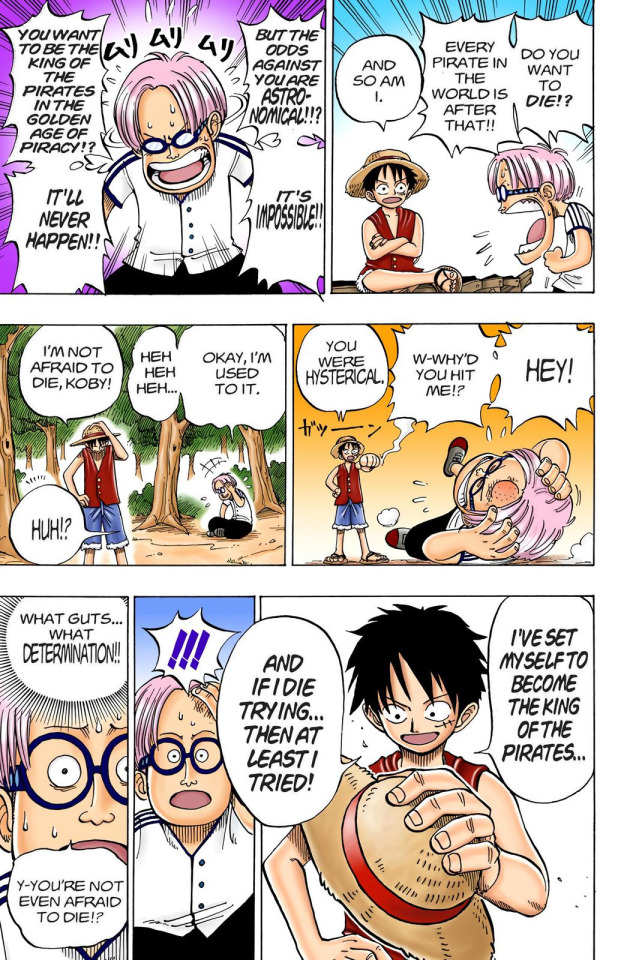
The first panel on this page shows a rare moment of uncertainty from Luffy, as he states his belief that he'll succeed (hat held to his chest), before he wonders, briefly, if he's deluding himself. It's a fascinatingly rare and telling moment of introspection - this is a very young Luffy, just starting out, with no crew yet to stand behind him, having a moment of doubt. Still, he immediately proves his statement from just a few moments earlier - he puts the hat back on. If he dies trying, at least he tried.
In the same moment, Koby is rapidly seeing the appeal of Luffy's "no regrets" lifestyle, and shares his own dream - to join the Marines and fight "the bad guys". Luffy's surprise is a bit palpable here, and I think this speaks, again, to the difference in their outlooks. Luffy is, as we well know, someone who values freedom in all respects. One of the main ways this shows itself is his refusal to let anyone else define, control, or intentionally influence him, even if they want to do so out of a desire to be helpful. Koby, meanwhile, is clearly looking for an element of belonging - his offhand mention of "the bad guys" makes it clear that he wants to be one of "the good guys", he wants to be one of these helpful, protective types that Luffy finds annoying.
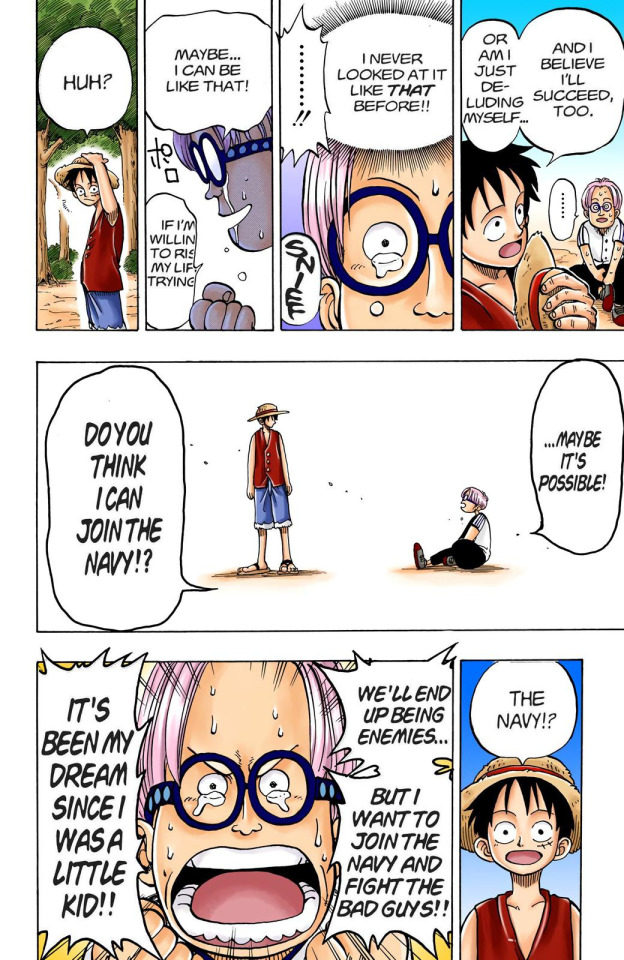
Not that he thinks there isn't any use to them - he doesn't shoot down Koby's dream. I think there are probably elements of differing experience at play here, as well; Luffy has hung around pirates, bandits, and other ne'er-do-wells, and has already attained a pretty nuanced view of what constitutes good vs evil that Koby (who has spent two years as the prisoner of the fairly stereotypical pirate) has clearly not had. It speaks well to Luffy's emotional intelligence (and his tendency to let people steer their own course and figure shit out on their own) that he seems to recognize this.

Despite all this bravado in their moment alone, Koby is still unable to defy Alvida until Luffy does so first. Koby's defining characteristic early on, aside from his own fear, perhaps, is his awareness of his own weakness. His desire to join the Marines is borne not simply out of a sense of justice, but of a desire to be part of something that will make him stronger.

In this sense, he and Luffy aren't that different. Luffy, too, is looking for a group to make him stronger, but he has both a desire to choose his companions, as well as faith in himself to make the right choice - he's not locked to the comforting idea of an institution the way that Koby is. Their differing world views are on display once more as Luffy throws the idea of the demon pirate hunter being a "good guy", and Koby dismissing the idea outright.

We aren't done with Koby yet, though. Next stop, Shells...
2 notes
·
View notes
Text
One Piece Reread Chapter 1: Romance Dawn
It's time to kick off our reread with the very first chapter, titled (by now, very famously) Romance Dawn.
(index | next)

The first thing that comes to mind as I open to the first page is, ironically, of adaptations - at this time, every major screen adaptation of One Piece (it remains to be seen how Wit Studio will play it) has made changes to the sequence of events in the beginning of the story, either postponing the flashback to later episodes (as in Toei's anime) or interspersing the events via flashbacks in the first few episodes (as in the Netflix show). No doubt there are pacing concerns, but I find I much prefer the manga's decision to have the story play out in its entirety before we join Luffy in the present - it allows us to get acquainted with his character, and we already feel attached to him as the journey begins. We know where he came from, and we're already looking forward to travelling with him in pursuit of his ambition.
(There's also just the fact that Romance Dawn is a solid introductory chapter - so much so that its structure can be found in a lot of other manga that came after it. Just look at the first chapter of Naruto, which is almost beat for beat.)
Regardless, we open on the iconic stage-setting of Roger's execution. I'm somewhat vindicated to see that I did remember correctly, the manga (the Viz English translation, at the very least) does specify the manner of execution as beheading. This is another detail that adaptations have shied away from, from what I've seen, at least - either by avoiding showing the actual moment of death (Toei) or changing it to stabbing, for some reason (Netflix). I feel like that takes away from a very strong visual of a man cut off mid-laugh. I would be curious to know if the original Japanese also alludes to beheading, or if it is a more general term for execution that's used.

We travel, then, to Windmill Village, where I'm drawn in by the description of the place:
"A small harbor village. One year ago, a pirate ship made the village its base. The wind blows from the east. And the village is at peace."
It definitely feels like the sort of quote that might come back around, perhaps at the very end.
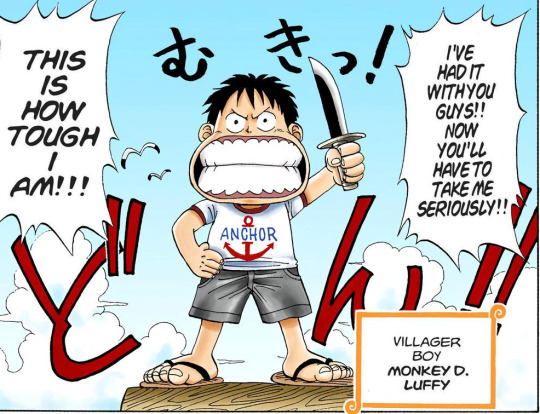
Luffy is first introduced to us as "villager boy" Monkey D. Luffy. The Red-Hair Pirates are nonchalant about his holding a knife, and about his (somewhat ominous) declarations - it's clear that he's already somewhat famous to this, and they're all used to it. Not so used to it, of course, that they're not taken aback by him trying to take his eye out, but by the time the scene changes to the Partys Bar, they're all in high spirits, drinking to Luffy's courage and their voyage. Their familiarity is clear, as is the very early institution of some of the series' most recurrent themes.


From the very beginning, Luffy is drawn to good times, adventure, and, most importantly, freedom.
Interestingly, Shanks rejects his crew's estimation of the pirate's life, which carries fascinating implications for his character. Shanks is pigeonholed often as being relatively laid-back, and while it might often be true, in his first and most extended appearance, he's actually quite serious about instilling the dangers of life at sea.

For as often as he's playing jokes, he's got something to say that sounds incredibly cryptic in retrospect, given what we know at this point, and what we can reasonably infer. (Roger, what was it you said to him when you came back from Laugh Tale?)
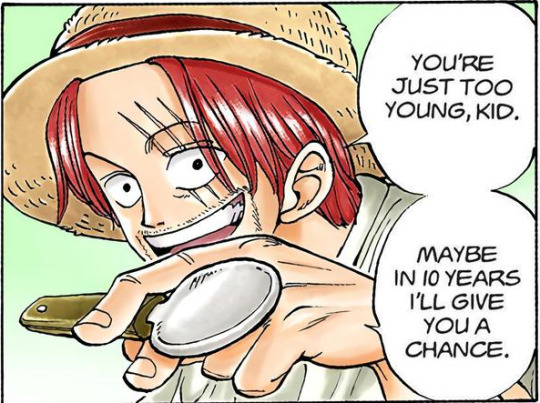
Funnily enough, Luffy seems to have a lot of respect for Beckman - calling him by the very polite "Mr. First Mate" and listening fairly diligently to his explanation for Shanks' rejection (even if he rejects it, though even Beckman admits that Luffy may have a point). For all the ways that Luffy and Shanks are alike in somewhat-irreverent disposition, Luffy does respond well, in this case, to being taken seriously, having Shanks' reasoning explained to him, and being treated with the assumption that he's capable of understanding (put a tally on the "Luffy isn't as dumb as you think he is" chalkboard, and leave a lot of room, because I'm going to be harping on it the whole way through).
Shanks and Luffy's relationship rightfully gets a lot of press, but I think this interaction does a lot to show that there's a pretty solid bond between Luffy and Beckman as well. I almost feel like Beckman was primed to handle Luffy from having to wrangle Shanks for a living.
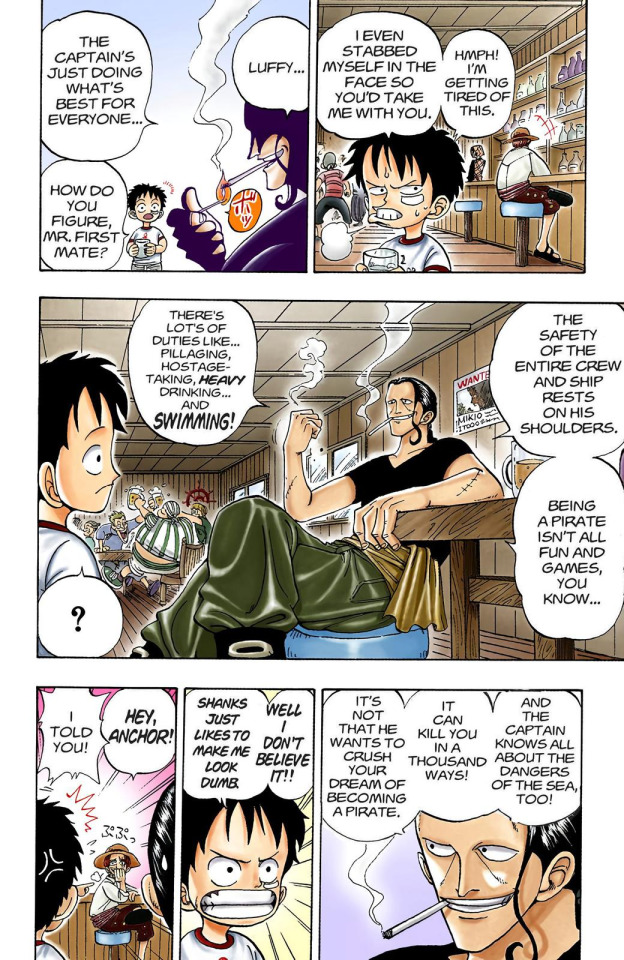

Makino is a character that fascinates me. What happens to leave a nineteen year old as the proprietress of a bar? How did she end up as the one looking after Luffy? I doubt we're likely to get answers, but if our suspicions about her baby pay off, maybe there's a chance.
Higuma arrives, and there is brilliant economy of storytelling in these few panels - Makino's alarm, Shanks eyeing the hand on the counter, poised to step in, and Luffy eating... what is that? This is actually the first panel in which the Gomu Gomu no Mi appears. I actually went back to the last panel Luffy was in to double-check, and he was eating a regular bread roll. It's a Looney Tunes-type cut that provides an almost hysterical, irreverent laugh without breaking the mounting tension of the sequence. It really is a brilliant early example of the series' tone.

Another sequence that I feel the adaptations have failed to capture is that of Higuma breaking the bottles - the breakage is fairly violent, you actually see Shanks struggling with indignity and anger for a moment before schooling himself, which makes the lecture about choosing when not to fight feel much more effective.

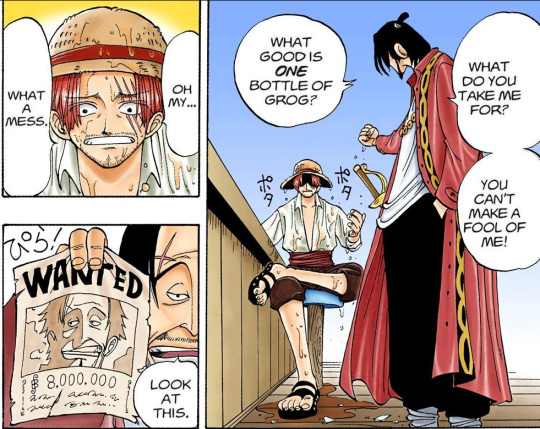
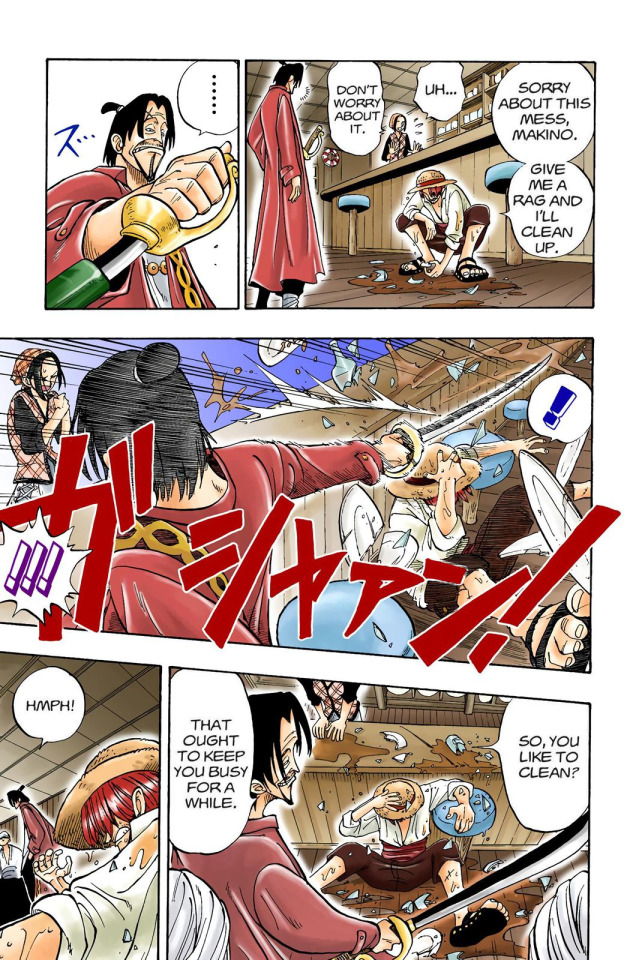
That said, Luffy answering Shanks' "where are you going?" with "to find a real role model" is hilarious. He was getting zingers in even as a little kid.
It's time, then, for the Red-Hair Pirates to discover that Luffy ate their Devil Fruit - one wonders whether they truly did just happen to swipe that one by chance, or if it was intentional, and bound for someone specific... regardless, I'm a big fan of the art in this panel. The tension of the moment is broken comedically a moment later, but there's a surprising amount of emotion packed into the gestures and the expressions here that very much pique my interest. Shanks, one of these days we'll figure out what's going on with you, but for now I can only wonder...

I notice that Luffy also calls other people in the village by their job titles - Mr. Fishmonger, Mr. Mayor. His characteristic bluntness follows, but it's a cute detail. I don't remember the habit persisting - I wonder if it was Ace's bad manners that led to him nicknaming everyone he meets in the future.
Shanks does this a few times within the chapter, which is interesting - a panel where his eyes will be in shadow, and he seems almost foreboding, followed by a panel where he's fully illuminated and seems his usual, much more approachable self. Whether it's simply foreshadowing the fact that he's much more of a heavy hitter than he passes himself off as, or if it's hinting at some deeper aspects of his nature, it's very intriguing.


And for another sequence that hasn't been touched in any adaptations, Shanks standing stock-still while Lucky blows a guy away point-blank, and then a couple pages later you get Beckman putting a cigarette out in another guy's eye. I really hope we get to see more of these guys in action soon.
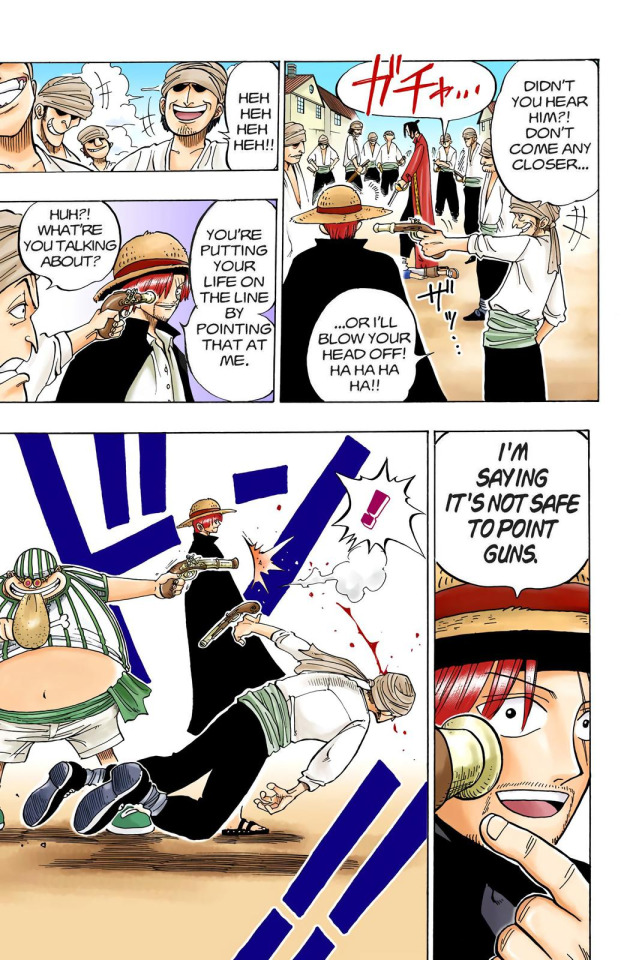

We're all familiar with what happens next - this all started because Luffy, despite being all talk about the Red-Hair Pirates being cowards, told Higuma he was wrong when he said the same, Higuma takes Luffy out to sea, Shanks breaks out Conqueror's Haki hundreds of chapters ahead of its formal debut (and then uses the secret fourth medical Haki to prevent himself from dying in 90 seconds via exsanguination of the brachial and axillary arteries - or something. Don't worry about it).
Something very interesting happens in a lot of emotionally significant moments for Shanks - a lot of the time, Oda doesn't let us see his eyes.
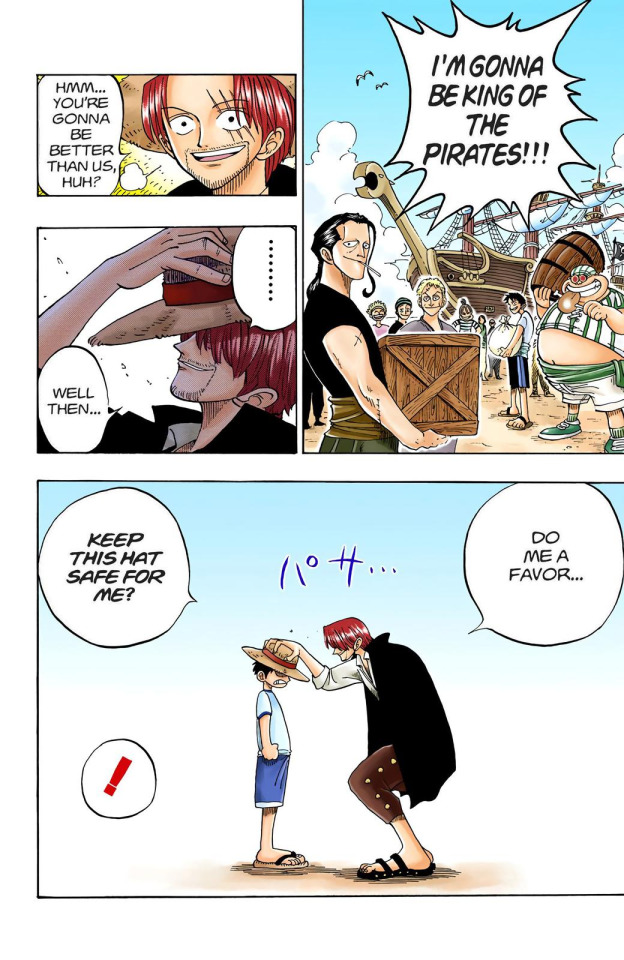
Poor Luffy tries so hard to play up his bravado, but it's already apparent that he doesn't deal well with goodbyes. Still, the stage is set - and the feeling is mutual.

Ten years later, the now-17 year old Luffy makes quick work of the Lord of the Coast and sets out, musing about the things he'll need (any takers on that tenth crew member)?
To me, the funniest change in Luffy from his child self to his young adult self is undeniably the attained nonchalance with which he confronts the things that befall him. On an informed level, we know that this is a Luffy who's spent the last ten years or so fighting lions, tigers, and bears in the jungle, but on a meta level, it works well to affirm what Shanks said just a few pages ago - he says Luffy is a lot like he was when he was a kid, and now, this older Luffy faces things with the same lightheartedness that we saw Shanks very consciously choosing. The explicit parallel between Luffy and Shanks goes a long way to characterize them both, to inform us of the hidden depths of our hero and plant the idea from the get-go that there's more to him than what might be apparent on the surface.


But anyway, down the water-hole Luffy goes - next stop, Alvida.
3 notes
·
View notes
Text
hi guys! you can call me ziv, and this is the blog where i've decided to share my in-depth reread of one piece. it wasn't too very long ago that i was introduced to this series, but it's very quickly made a place in my heart. i've seen a lot of love for one piece, and it's inspired me to do this as a blog rather than a notes page that i keep to myself. if you're here, thanks for stopping in; i hope you find something you enjoy :)
index
east blue
romance dawn - 1 2 3 4 5
1 note
·
View note